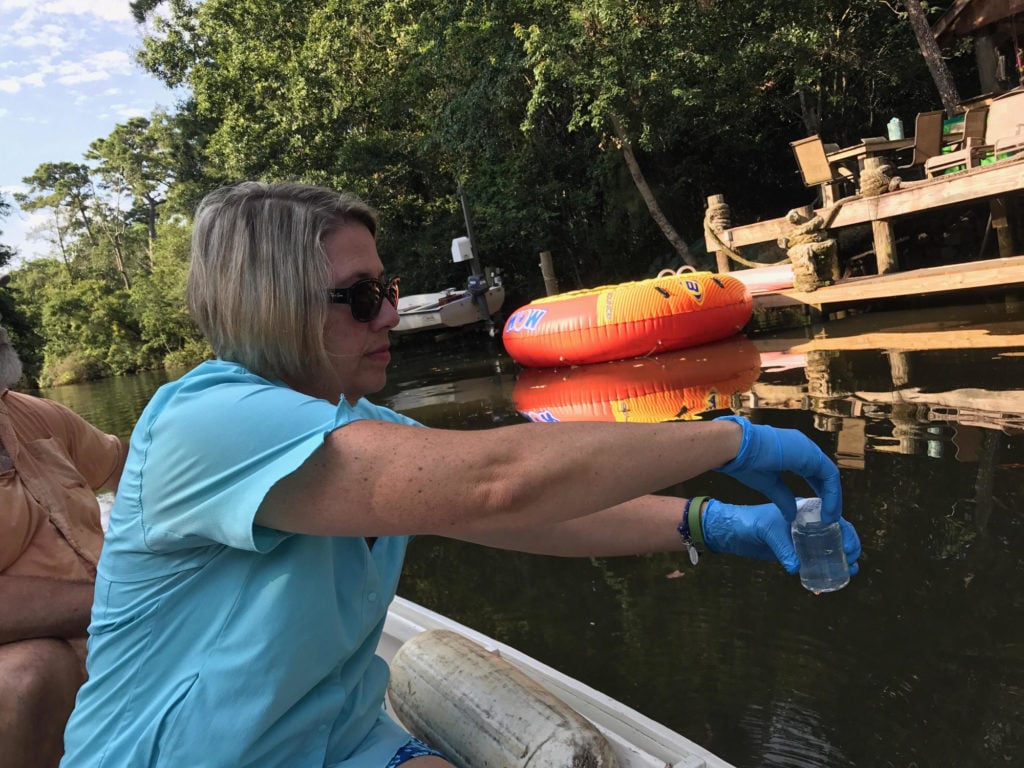After 20 Years, Threats Endure, and So Does the Mobile Baykeeper
By: Mobile Baykeeper
By Hanlon Walsh, Communications Director, Mobile Baykeeper

It has been raining for two days, and the sewers across the city of Mobile, Alabama, have begun to overflow from the torrents, sending thousands of gallons of untreated sewage into creeks and rivers.
Casi Callaway, now in her 20th year as the Mobile Baykeeper, has already been on the line with a reporter from the local TV station. “Sewage in our waterways is clearly a problem,” she tells him. She knows just where to point her finger – at the municipal water utility and its aging infrastructure.
“Since January 2017,” she continues, “the Mobile area has had more than 26 million gallons of raw sewage discharged into local waterways – most often because of aging lines incapable of handling rainfall. There needs to be a solution to stop these overflows.”
As the head of Mobile’s largest environmental advocacy organization, Casi knows full well that she has to keep pressing for improvements in the sewage infrastructure. But right now she must turn her attention to an even more urgent matter – a 600-acre coal-ash pond on the banks of the Mobile River at the Alabama Power Company’s James M. Barry Electric Generating Plant, about 25 miles north of downtown Mobile. This pond, unlined and with no protective barrier to groundwater, has received more than 21 million tons of highly toxic ash from the plant’s coal-fired units since 1965.
The facility’s location makes the situation even more dangerous, according to Casi. “The pond is surrounded by the Mobile River and sensitive wetlands in a low-lying area prone to flooding. It is held together by a dam made of dirt, clay, and coal ash – making it susceptible to collapse from the effects of a hurricane, heavy rain or structural failure.”

Mobile Baykeeper recently released a 232-page report describing the threats posed by the pond. Alabama Power has just announced its decision to cap the pond in place. And Casi’s phone is ringing off the hook with requests from local reporters to schedule interviews to discuss the breaking news.
“We’ve been investigating this issue for almost three years now,” she tells one reporter. “Our findings demonstrate that Alabama Power’s coal ash is polluting our groundwater with dangerous levels of arsenic, selenium, lead, and other heavy metals.
“The worst case scenario would be a breach of the dam. Imagine another BP Oil disaster, but with 20 times the amount of toxins that were spilled into the Gulf instead spilling into the Mobile-Tensaw Delta and eventually downstream through the port of Mobile and Mobile Bay. Alabama Power needs to be a leader on this issue and dig up the coal ash and move it away from the river to a lined, upland landfill.”
Casi is also preparing testimony that she will deliver before the U.S. EPA in Washington, regarding its proposal to weaken the very standards for coal-ash disposal that are protecting Mobile and many other communities from a possible disaster.
Later she meets with local decision-makers – first with the Army Corps of Engineers to ensure that all environmental impacts are weighed before deepening and widening the Mobile Ship Channel, and next with the Chamber of Commerce to advocate for restoration projects following from the BP oil disaster.
To many, juggling so many things would be overwhelming, but for Casi, it’s another day on the job. Ask her the key to her longevity and success and she’ll tell you it’s the willingness to collaborate. From elected officials and industry-leaders to business-owners and local fishermen, there’s no one she won’t work with to protect the Mobile watershed. But her approach may be tested as never before in her confrontation with Alabama Power. She’ll have to convince local citizens to send letters voicing their concerns; to work with leaders from the shipping, seafood, tourism and real-estate industries, whose livelihoods would be severely damaged by a coal-ash dam failure; and to educate fishermen, hunters, and boaters about the potential threats to their ways of life.
Casi says that, over her 20-year tenure, she’s learned that, above all, “you’ve got to stay positive and stay focused. Focus on that prize, no matter how far or distant it is. What we do isn’t easy, and being able to win is rare – really win, stop something or build something or don’t build something, it’s rare. But you can’t let that stop you. There’s just too much at stake.”